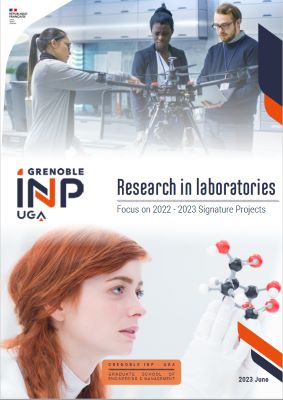They are called thematic research alliances, or research coordination alliances, or simply Alliances.
These are national consultation groups that bring together the main public research institutions with the aim of coordinating, in certain sectors identified as eminently strategic, the priorities of research and development in conjunction with the Ministry of Higher Education and Research and the agencies falling within its scope, such as the National Research Agency (NRA).
The Alliances were created in 2009 as part of the Ministry’s launch of the National Strategy for Research and Innovation (SNRI), which identified three priority areas for development:
These three areas have given rise to 5 Alliances, created between March 2009 and June 2010:
Translation of the institutions’ names:
In concrete terms, Alliances all share the following objectives in their respective fields:
These Alliances thus guarantee that the national research and innovation strategy is defined and implemented in line with the major scientific and technological challenges identified by the major players in the academic and industrial world.
Grenoble INP, whose trajectory has always been at the crossroads of scientific disciplines and societal challenges of the future, is naturally involved in these forward-looking initiatives.
Thus, Marc Aurousseau, Professor at Grenoble INP - Pagora and Scientific Director of Grenoble INP in charge of the Environment and eco-efficient production, is the CPU representative in the AllEnvi Alliance, Jean-Louis Roch, Director of Grenoble INP - Ensimag is the CDEFI representative in the ALLISTENE Alliance and Christian Schaeffer, Director of the Carnot Institute for Future Energies, will now represent Grenoble INP at the ANCRE Alliance. In this way, the institution benefits from valuable information relays and first-rate spokespersons within these "think tanks" where the strategic orientations of research in France are defined.
These are national consultation groups that bring together the main public research institutions with the aim of coordinating, in certain sectors identified as eminently strategic, the priorities of research and development in conjunction with the Ministry of Higher Education and Research and the agencies falling within its scope, such as the National Research Agency (NRA).
The Alliances were created in 2009 as part of the Ministry’s launch of the National Strategy for Research and Innovation (SNRI), which identified three priority areas for development:
1. health, well-being, food and biotechnology
2. environmental emergency and environmental technologies
3. information, communication and nanotechnologies
2. environmental emergency and environmental technologies
3. information, communication and nanotechnologies
These three areas have given rise to 5 Alliances, created between March 2009 and June 2010:
• AVIESAN, Alliance nationale pour les sciences de la vie et de la santé;
• ANCRE, Alliance nationale de coordination de la recherche pour l’énergie;
• ALLISTENE, Alliance des sciences et technologies du numérique;
• AllEnvi, Alliance nationale de recherche pour l’environnement;
• ATHENA, Alliance nationale des sciences humaines et sociales.
• ANCRE, Alliance nationale de coordination de la recherche pour l’énergie;
• ALLISTENE, Alliance des sciences et technologies du numérique;
• AllEnvi, Alliance nationale de recherche pour l’environnement;
• ATHENA, Alliance nationale des sciences humaines et sociales.
Translation of the institutions’ names:
- AVIESAN, National Alliance for Life Sciences and Health;
- ANCRE, Alliance nationale de coordination de la recherche pour l'énergie;
- ALLISTENE, Alliance des sciences et technologies du numérique;
- AllEnvi, National Research Alliance for the Environment;
- ATHENA, National Alliance for Humanities and Social Sciences.
- ANCRE, Alliance nationale de coordination de la recherche pour l'énergie;
- ALLISTENE, Alliance des sciences et technologies du numérique;
- AllEnvi, National Research Alliance for the Environment;
- ATHENA, National Alliance for Humanities and Social Sciences.
In concrete terms, Alliances all share the following objectives in their respective fields:
• To coordinate the actors of the programme function around scientific and technological priorities,
• To develop national programmes responding to these priorities and modalities for these programmes implementation,
• Strengthen partnerships and synergies between all research operators in the field, universities, schools, institutes, and also companies, in particular within the competitiveness clusters,
• Extend national priorities and programmes into the various European and international initiatives in the field.
• To develop national programmes responding to these priorities and modalities for these programmes implementation,
• Strengthen partnerships and synergies between all research operators in the field, universities, schools, institutes, and also companies, in particular within the competitiveness clusters,
• Extend national priorities and programmes into the various European and international initiatives in the field.
These Alliances thus guarantee that the national research and innovation strategy is defined and implemented in line with the major scientific and technological challenges identified by the major players in the academic and industrial world.
Grenoble INP, whose trajectory has always been at the crossroads of scientific disciplines and societal challenges of the future, is naturally involved in these forward-looking initiatives.
Thus, Marc Aurousseau, Professor at Grenoble INP - Pagora and Scientific Director of Grenoble INP in charge of the Environment and eco-efficient production, is the CPU representative in the AllEnvi Alliance, Jean-Louis Roch, Director of Grenoble INP - Ensimag is the CDEFI representative in the ALLISTENE Alliance and Christian Schaeffer, Director of the Carnot Institute for Future Energies, will now represent Grenoble INP at the ANCRE Alliance. In this way, the institution benefits from valuable information relays and first-rate spokespersons within these "think tanks" where the strategic orientations of research in France are defined.




